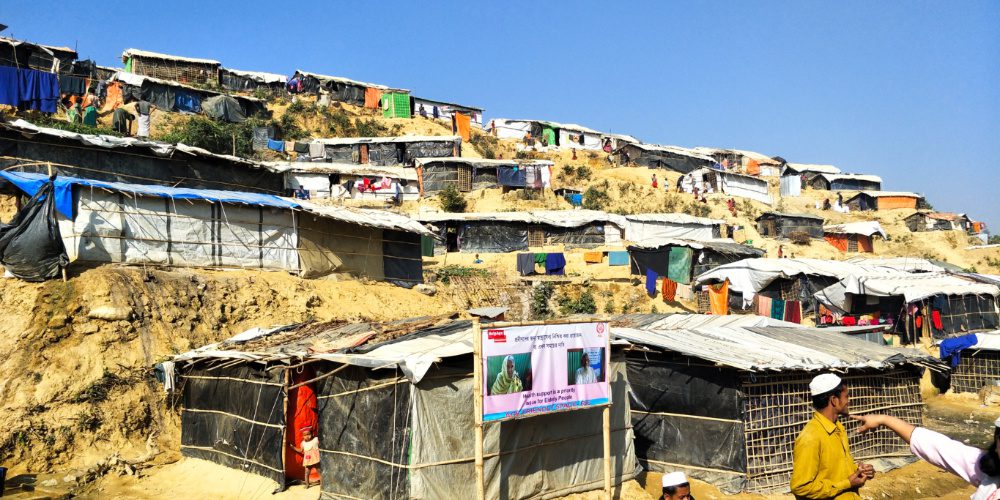
Camp Conditions
As of January 10, 2019, there are 909,207 identified Rohingya refugees in the camps (209,078 households). Of these households, 31% have been identified with at least one protection vulnerability. Notable improvements to camp living conditions have been implemented. As of December 2018, camp authorities have constructed 70 miles of pedestrian paths, 375 pedestrian bridges, and about 15 miles of roads. In addition, a little over 89 miles of drainage lines have been built. Although infrastructure improvements have been made, the camps still have major challenges concerning food insecurity, clean water, social tensions, and risks of landslides and flooding. Those living in areas at risk of landslides were prioritized for relocation, which includes 18,674 individuals / 4,425 households. HelpAge and partner NGOs continue to monitor the situation closely.
HelpAge’s Humanitarian Response
Since August of 2017, HelpAge, together with local partners Resource Integration Centre (RIC) and Young Power in Social Action (YPSA), has delivered inclusive humanitarian relief to older Rohingya refugees and their families. Through ‘Age-Friendly Spaces,’ we deliver access to medical assistance, psychosocial support and counseling, accessible sanitation facilities, and recreational activities. The Age-Friendly Spaces are a one-stop shop for older people to access critical services. Older people who frequent the spaces have dubbed it their “house of peace.” In addition to the Age-Friendly Spaces, HelpAge and its partners also provide home visits and referrals for health services, shelter support, and registration.
Project Updates
Project monitoring of the humanitarian response has shown that a dedicated space for older people has helped improve access to relief and services. A third Age-Friendly Space in Camp 11 was built last year after the completion of a nearby road.
In focus group discussions, older people in the camps indicated that the lack of a dedicated line for older people, people with disabilities, and pregnant women present a major challenge. It was reported, for example, that an older woman passed out while waiting in line to claim her relief items.
Starting in April of last year, HelpAge also expanded its response to reach older people in host communities in addition to refugees living in the camps.
Between April-December 2018, HelpAge has:
- Delivered health screenings to 2,854 older people;
- Screened and treated 4,135 older people through our mobile paramedic teams;
- Visited 401 older people through home-based care services;
- Counseled and provided psychosocial support to 3,596 older people;
- Assisted 7,100 older people through accessible latrines and handwashing stations;
- Provided 2,630 older people from host communities with cleaning materials.
To help older people in the camps weather the cold winter temperatures, HelpAge continues to distribute warm clothes and blankets. So far 6,625 older people have received warm clothes.
Coordination and Advocacy
HelpAge is a part of the 2019 Joint Response Plan for the Rohingya Humanitarian Crisis (JRP), a task force of NGOs that identifies gaps in protection and proposes solutions to support Rohingya refugees. The 2019 plan covers multiple sectors including protection (e.g. preventing gender-based violence), food security, nutrition, WASH, health, shelter, site management, and education.
In order to strengthen tracking and monitoring of programs implemented in the camps, HelpAge, together with local partners, introduced a web-based data management system for the storing and analysis of data disaggregated by sex, age, and disability in November 2018. Training on the web-based data management tool has been delivered to staff at partner organizations.
As a part of the Inter-Agency Standing Committee (IASC) for the Rohingya Response in Cox’s Bazar, HelpAge has contributed to the development of the Guidelines on Inclusion of Persons with Disabilities in Humanitarian Action. The guidelines will be used to increase awareness of disability issues among humanitarian actors and foster the integration of inclusive measures into upcoming programs in the camps.
To learn more about HelpAge’s work to ensure older people are reached in emergencies, watch our video on the importance of humanitarian inclusion, featured below.


